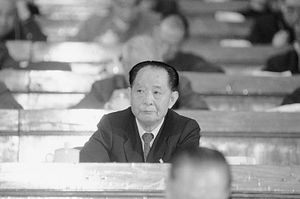Xi Jinping’s fate as the son of Communist revolutionary Xi Zhongxun is a mixed bag of privilege and purge, both of which determined Xi Jinping’s path and opportunities. Two ironies of Xi’s position as now-tenured leader of China are highlighted in the events that began 29 years ago this month in Tiananmen Square in Beijing. Both ironies lie within the relationship that Xi’s father, Xi Zhongxun, had with the reformer Hu Yaobang, the former general secretary of the Communist Party, whose death on April 15, 1989, sparked the demonstrations that led to the infamous crackdown on June 4.
Hu Yaobang, it must be remembered, was a true Communist stalwart. The students who came to the Square came to honor a man who had been at the vanguard of the Communist Revolution; they did not initially come to protest against the Communist Party directly. But Hu was a reform-minded, liberal Communist. Perhaps unique among Communist Party leaders of any country, Hu took two positions that stand in stark contrast to today’s political environment in China. One, he expressed support for establishing laws to protect freedom of the press. Two, he helped to abolish the post of Party chairman in favor of collective leadership, in order to prevent a future resurgence of a Mao-like cult of personality, and the concentration of power in one person.
Hu, the liberal reformer, also played an unwitting but defining part in Xi Jinping’s life. Hu played a pivotal role in rehabilitating the political fortunes of Xi Zhongxun, Xi Jinping’s revolutionary hero father. By ending the elder Xi’s 16-year purge from the Party, and restoring him to a Party position in Guangdong, Hu Yaobang paved the way for the elder Xi’s continued power and influence, and for the younger Xi’s rise to ultimate power in China today.
Xi Zhongxun did not forget his friend’s actions. Both had lived and worked in Shaanxi Province, and had shared similar struggles. (Indeed, Xi Jinping himself spent many years in Shaanxi when he was “sent down” to the countryside during the Cultural Revolution.) Ten years after his own rehabilitation, it is reported that Xi Zhongxun returned the loyalty by refusing to join in the scathing criticism that Hu Yaobang himself came under after supporting students who demonstrated for greater freedoms in late 1986.
Xi Jinping’s father, by refusing to join in the backlash against Hu, risked himself. When Hu was removed by Deng Xiaoping as general secretary of the Communist Party in January 1987, he had already endangered himself in other ways, as well. During the 1986 summer prior to Hu Yaobang’s removal as general secretary, Hu heard and supported a call for greater openness, discussion, and criticism of the Party, echoing a 1956 order under Mao Zedong to “Let a hundred flowers bloom” — which ultimately was used to crush dissent. This time, however, intellectuals and others were promised that no such retaliation would occur. Hu’s stance was another plank in his ouster as Party chief, and placed not only himself, but his supporters as well, in dire political jeopardy.
Ironically, Xi Jinping’s power today – which he is using, among other things, to strengthen censorship and control over the internet and all forms of media — is rooted in his father’s resuscitation by Hu Yaobang, a man who believed in greater freedom of the press and freedom of expression, not less. Xi Jinping, by maneuvering for the removal of term limits for his post as president, now holds tenure for life, power made possible by Hu, who did his best to dismantle the possibility of such overarching power in the hands of one person. One must wonder if these ironies are appreciated in China today.

































